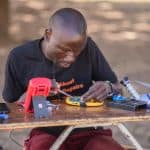Solving the Problem of Renewable Energy Waste: A Circular Economy Approach to Sustainable Batteries
Energy storage – in batteries – is an essential part of the global green revolution. By providing energy security when using intermittent sources of power, such as wind or solar, batteries ensure that every unit of energy generated is put to use. This is particularly valuable in developing regions, such as sub-Saharan Africa, since a reliable energy supply is the principle driver of economic prosperity. By opening up the opportunity to connect more homes and businesses to reliable power, clean energy enables business development and economic growth.
Despite its many benefits, the clean energy revolution has one notable downside. The battery-based energy storage systems that underpin localised clean energy have a limited lifespan. This means that waste is becoming a fast-growing problem. By 2030, there could be 11 million tonnes of battery waste from electric vehicles alone. Combined with the ever-growing solar lighting market – as well as other battery-driven devices such as traditional energy storage, phones, laptops, leisure products, etc. – this adds up to a large and growing problem that needs to be managed.
In response, in 2016 Aceleron co-founder Carlton Cummins and I set about developing the world’s most sustainable battery technology, specifically designed for the circular economy, to ensure that 100% of the material value is reusable, not wasted.
Reducing battery waste
Traditional lithium-ion batteries are welded or glued together, making individual components difficult to replace. If one part fails, the whole battery is usually thrown away – often with more than 80% of its potential life left unused. This adds to the mounting problem of battery waste.
In response, Aceleron developed and patented a battery assembly technology for use across a multitude of applications. This approach enables the batteries to be serviced, upgraded and repurposed when they’re no longer suitable for their first life. Aceleron’s design facilitates the easy replacement of components, extending the life of batteries and significantly reducing waste. This, coupled with advanced machine learning technology that can tell which components are faulty, means our batteries can function for up to 25 years with appropriate maintenance and servicing, more than doubling the lifespan of traditional lithium-ion batteries.
Bringing clean energy to developing regions
Early on, we decided that our battery business should not only be a world leader in sustainable battery technology – it should also have a positive social and economic impact, improving the lives of as many people as possible. Thanks to support from international partners, we’ve been able to progress toward these dual goals by bringing our technology to sub-Saharan Africa.
As mentioned above, energy is one of the foremost drivers of economic growth in the region – and yet more than half a billion people in sub-Saharan Africa lack access to electricity. Fortunately, advancements in clean technology have the potential to address this issue. Many African countries are burdened with ageing energy networks that are unable to cover the entire country. Clean technology is enabling the continent to leap-frog more developed nations and rapidly deploy low-carbon and low-cost energy systems in urban and rural areas.
To help support these efforts, Aceleron has partnered with Total Access to Energy Solutions (TATES) in Kenya to repurpose lithium batteries from their used solar products into new battery packs, at a price that rivals the shorter-lifespan lead acid batteries that are traditionally used.
Repurposing batteries that would otherwise have been discarded not only reduces waste, it also makes energy storage more accessible to those who can’t afford it. And giving “waste” battery components a previously unobtainable second life has an additional benefit: It creates employment. Through the project with TATES, local people have been trained to test, service and build these storage devices – providing jobs and boosting local economies.
We hope that as we scale projects like this, we can create more skilled jobs and contribute to Africa’s booming green employment market.
Energy storage as a service
Though the potential for clean technologies is vast, there is still substantial investment required to meet energy needs across the African continent. That’s why we are working with the Shell Foundation and the U.K. government’s Department for International Development (DfID) to introduce energy storage as a service and deliver accessible clean energy to off-grid communities in Kenya. We recently won a CLASP Global Leap award to expand our operation into Rwanda, and we are also looking to expand into Sierra Leone, Ethiopia, Nigeria and Madagascar through grants and partnerships.
Providing energy storage as a service offers key benefits to solar home system manufacturers and their customers. It allows off-grid families to rent batteries at an affordable rate, so they can benefit from energy storage from small-scale renewables like home solar panels, using them to power home appliances such as refrigerators, TVs or lights, for as little as US $2 per month. This innovative approach is making traditionally costly off-grid energy more affordable and useful to those who need it, as the lead batteries traditionally included in a solar home system only last two or three years and hold less energy. Our batteries also provide electricity for longer periods and charge faster than the traditional alternatives, allowing them to power households at night, which is when energy is mainly needed.
The increased lifecycle and ease of repair of our batteries also reduces their lifetime cost, enhancing the economics of energy storage as a service and further improving the accessibility of this previously unaffordable technology. What’s more, by extending the lifespan of batteries, Aceleron’s circular economy technology dramatically reduces the potentially valuable waste that would otherwise go to landfills.
Lighting up Africa
Circular economy lithium-ion batteries provide a smart solution to the problem of delivering accessible, clean energy without contributing to e-waste. However, reducing battery waste and increasing energy accessibility will not happen overnight, and several challenges remain. For instance, more financing partners are needed, to allow this technology to be offered on a larger scale and to more solar home system manufacturers. Also, the battery manufacturers need additional support for last-mile distribution, to help them get the product to potential customers.
The next 10 years will be pivotal in delivering a global green revolution. But for that revolution to make an optimal impact, the sustainable energy industry will need to find ways to minimize the environmental impact caused by its own vital work – while also making its products affordable to all. We are confident that by upscaling pioneering energy storage technology like ours, we can advance toward those goals, driving development, economic growth and green sector employment, and illuminating Africa and the world with clean energy.
Amrit Chandan is the CEO at Aceleron.
Photo courtesy of Science in HD.
- Categories
- Energy, Environment



